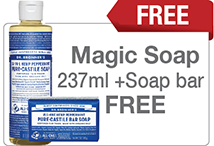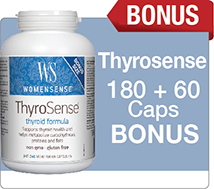- 130mg
- Organic Stevia Extract (Stevia rebaudiana)(Leaf)
- 900mg
- Inulin (FOS)(from Chicory Root)
- 50mcg
- Chromium (from Chromium Chelavite-HVP chelate)
Silica
Format
 Packets
Packets
100x1g
Dosage
Add 1 packet to water, stir and drink. Use to sweeten any beverage, adjust to taste.
Important Information
Free of all common allergens, including: wheat, dairy, eggs, corn, and yeast.
- Convenient 1.1 gram packets.
- Natural calorie-free sweetener.
- Safe for diabetics.
- Aspartame free.
- No bitter after taste.
Related Videos
No Related VideosArticles by a naturopathic doctor.
Since 1968 NOW has been a leader in the natural products industry. NOW Foods is an award-winning and highly respected manufacturer of vitamins, minerals, dietary supplements and natural foods. Now Foods brings you over 1600 Natural Foods, Supplements, Sports Nutrition and Personal Care Products. NOW supplements are high quality products at affordable prices.
Stevia - The Natural Sweetener
Stevia rebaudiana is a small shrub native to Paraguay and Brazil, where it has a long history of use among the Guarani Paraguayan Indians. Stevioside is the component of stevia that has been attributed to the unique qualities of this traditional herbal product.
Now Foods has concentrated the stevoides in this product and packaged it in convenient single serving packets.
The stevia plant is most widely used a non-sugar sweetener in a variety of foods and drinks. Stevia has no calories and does not affect blood sugar like most natural sweeteners (sugar and honey).
The active constitutes in Stevia include various glycosides, particularly stevoside, are what give stevia its unique sweetness. Stevoside is between 100 and 200 times sweeter than sugar.
Use Stevia for almost anything, including:
-Coffee and Tea
-Soups, Stews and Sauces
-Muffins, Cookies and Baked goods
-Preserves
-Hot or cold cereals
-Pudding and juices
...or whatever you desire!
Stevia can sweeten almost any food or drink with no added calories, no carbohydrates, no tooth decay and is diabetic and hypoglycemic safe. Stevia nourishes the pancreas and does not raise blood glucose levels, making it not only safe for diabetics but also beneficial. Since there are no calories or carbohydrates, stevia is an excellent weight loss aid. It does not cause the negative side effects often reported with the use of artificial sweeteners. Adding stevia to your diet on a regular basis has been reported to help minimize hunger sensations, cravings for sweets or fatty foods, aide in digestion, decrease hypertension without effecting normal blood pressure, stabilize blood glucose levels, shorten recovery time from cold and flu and aid in addictions to tobacco and alcohol. When used in toothpaste or mouthwash, cavities and gum disease is reduced due to its antibacterial properties.
Sugar, Artificial Sweeteners & Natural Sources
There really are a number of reasons why making your home a sugar free one has enormous health benefits for adults and children alike...
And for all of you sceptics out there, it really is do-able. After you have gone sugar free for a couple weeks, you will notice that you crave less and your taste buds will become much more sensitive to sweet meaning once you have sugar again, it takes very little to do the trick.
What's so wrong with sugar?
It's really all about the amount of sugar we are eating. Among one of the most concerning side effects, in my opinion, is sugar's effect on the immune system. Research has clearly shown that sugar slows the immune response. Glucose also leads to increased insulin release, which prevents the synthesis and release of growth hormone. Growth hormone, as the name implies is responsible for normal growth and development and without it, growth deficiencies develop. The impact that sugar has on the immune system is the most profound at approximately 2 hours after ingestion, when immune cells are at their lowest. What I find even more concerning is that at 5 hours, although better, this suppression is still noticeable. If you are someone that enjoys a little sweet with all of their meals or snacks, your immune system could actually never be working at its full capacity!!!
There is also a growing concern in today's society about obesity and maybe most concerning, childhood obesity. We have come to understand over the past decade that this may have much more to do with sugar than it does with fat. Foods high in sugar/glucose force the body to release insulin in high amounts in order to get glucose into the cells to use for energy. What we do not use immediately gets stored as fat or triglycerides. Regular ingestion of foods that are high in sugar or cause an extremely quick or high rise in blood sugar will lead to more triglycerides being produced than the body can ever manage to use. In this sense, a high sugar diet will lead to weight gain and most likely cardiovascular issues down the road.
Where is the sugar?
A lot of sugar can be hidden in products that there is simply no need for sugar to be. The highest source, by far is Pop (Soda), followed closely by sports drinks, fruit juice, prepared or ready made foods, ketchup, peanut butter, breakfast cereals and virtually anything that is advertised as low fat. These sugars are commonly in the form of high fructose corn syrup (HFCS). This is why label reading is so important, anything that lists corn syrup, sugar, sucrose or a similar "_ose" in the first 3 ingredients, is going to be very high in sugar. Keep in mind, this also means it is bound to be pretty high in calories, as well.
As a general rule, stay away from anything that says high fructose corn syrup (or just corn syrup) on the label, not only is it extremely sweet but it is nutritionally deplete and has a very high glycemic index, meaning it quickly and significantly increases blood sugar.
Stevia - Stevia is a calorie and carbohydrate free natural sweetener. It can be used wherever sugar is called for in baking, but keep in mind it is said to be 300 times sweeter than sugar, so you'll want to use significantly less. That being said, stevia does not effect blood sugar the same way that sugar does and is safe in moderation for diabetics.
Artificial Sweeteners
Now that I have got your attention with some of the health risks associated with a high sugar diet, let me also say that artificial sweeteners in excess are also NOT the answer. And certainly, if you don't have concerns about blood sugar regulation, there is really no need to use them. Although they are certainly fewer in calories, more and more research is showing that artificial sweeteners do not lead to weight loss. Artificial sweeteners do an excellent job at confusing the body. Artificial sweeteners may not signal the same satiety hormones as sugar does, although our body still tastes the sweet and insulin is still released. Therefore we are more prone to overindulging in these 'low cal/sugar free' treats. The more sweet we eat, the more sweet we crave. Especially in the case of artificial sweeteners, which have such a low caloric impact. The over-use of artificial sweeteners simply increases cravings for more sugar and they cycle continues. Although the majority of the early studies which linked a number of artificial sweeteners to cell growths have been disputed, the fact of the matter is, these substances are not naturally occurring in the body and our body is rather uncertain of what to do with them. As we are a society of excess and use of these artificial sweeteners increases, so must our recognition of the fact that we simply do not know what the ramifications of these substances are in the body. Best to use with caution, or don't use at all.
Here is some info on a few of the more popular artificial sweeteners:
Splenda (Sucralose) Once thought to be the 'healthiest alternative', there is some evidence to suggest that Splenda actually contains a bulking agent made from derivatives of corn syrup (= SUGAR). Being 600 times sweeter than sugar itself, the amount of sucralose alone that would be necessary to sweeten your morning coffee is so minimal that it must be combine with a bulking agent in order to package. Although still very low in calories, this may have side effects for diabetics who are consuming splenda in large amounts.
Nutrasweet/Equal (Aspartame) Aspartame is a combination of L-aspartic acid and L-phenylalanine. It has 24 calories per tsp. and is 180x sweeter than sugar. There have been claims in the past that aspartame can lead to brain tumors, but it appears that scientific research does not support these findings. That being said, individuals with phenylketonuria (PKU) need to avoid aspartame, as do individuals who are prone to headaches, as there is some moderate evidence to suggest it exacerbates this issue.
Sweet N' Low (Saccharin) Around since 1879, saccharin contains 1/8 calorie per tsp. and it is 300 x sweeter than sugar. Again, there were studies in the 70's (leading to an FDA warning on the label, which has since been removed) linking saccharin to bladder growths in rats. These studies have since been shown to be a poor quality. That being said, saccharin is known to have a bitter chemical aftertaste and not enjoyed by all.
- Reviews
- POST A NEW REVIEW





















